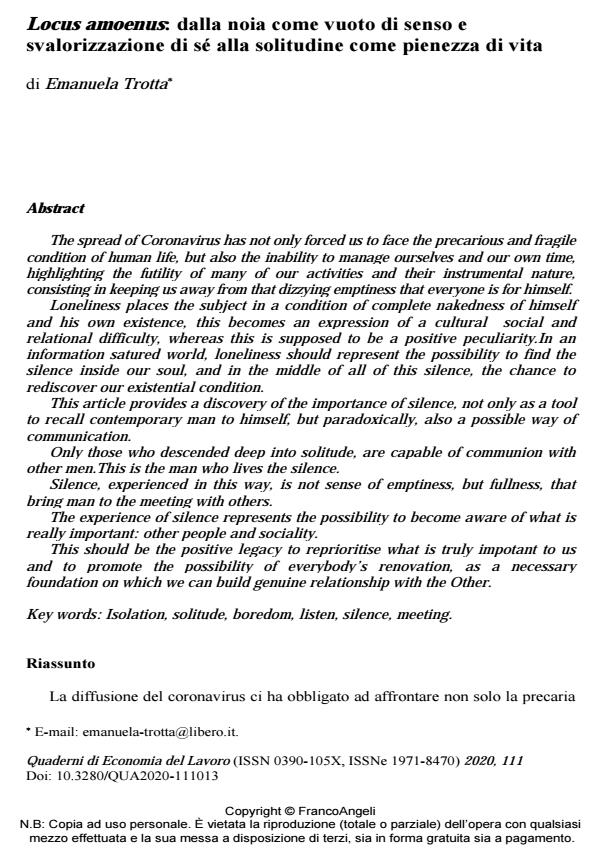Locus amoenus: dalla noia come vuoto di senso e svalorizzazione di sé alla solitudine come pienezza di vita
Titolo Rivista QUADERNI DI ECONOMIA DEL LAVORO
Autori/Curatori Emanuela Trotta
Anno di pubblicazione 2021 Fascicolo 2020/111
Lingua Italiano Numero pagine 10 P. 291-300 Dimensione file 155 KB
DOI 10.3280/QUA2020-111013
Il DOI è il codice a barre della proprietà intellettuale: per saperne di più
clicca qui
Qui sotto puoi vedere in anteprima la prima pagina di questo articolo.
Se questo articolo ti interessa, lo puoi acquistare (e scaricare in formato pdf) seguendo le facili indicazioni per acquistare il download credit. Acquista Download Credits per scaricare questo Articolo in formato PDF

FrancoAngeli è membro della Publishers International Linking Association, Inc (PILA), associazione indipendente e non profit per facilitare (attraverso i servizi tecnologici implementati da CrossRef.org) l’accesso degli studiosi ai contenuti digitali nelle pubblicazioni professionali e scientifiche.
La diffusione del coronavirus ci ha obbligato ad affrontare non solo la precaria e fragile condizione dell’esistenza umana, ma anche l’incapacità di gestire sé stessi e il proprio tempo, mettendo in risalto la futilità di tante nostre attività, e della loro natura strumentale, consistente nel tenerci distanti da quel vertiginoso vuoto che ognuno è per sé stesso. La solitudine pone l’individuo in una condizione di completa nudità di fronte a sé stesso e alla propria esistenza, diventa espressione di un disagio culturale, sociale e relazionale, mentre dovrebbe essere una peculiarità posi-tiva. In un mondo saturo di informazioni, la solitudine, dovrebbe rappresentare la possibilità di ritrovare il silenzio dentro la propria anima, e in questo silenzio risco-prire la nostra condizione esistenziale. Quest’articolo propone una riscoperta del valore del silenzio, non solo come strumento per richiamare l’uomo contemporaneo a sé stesso, ma anche, parados-salmente come possibile modalità comunicativa. Solo chi è sceso in profondità, nella propria solitudine, è veramente capace di comunione con gli uomini. Questo è l’uomo che abita il silenzio. Così percepito, il silenzio, non è vuoto, ma pienezza, perché apre l’uomo all’incontro. L’esperienza della solitudine costituisce la prezio-sa possibilità di prendere coscienza di ciò che è veramente importante: gli altri, la socialità. Sarebbe questo il lascito costruttivo, ristabilire le priorità, promuovere la possi-bilità di rinnovamento e ristrutturazione di sé, come base necessaria su cui instaurare un rapporto autentico con l’Altro.
Parole chiave:Isolamento, solitudine, noia, ascolto, silenzio, incontro.
Emanuela Trotta, Locus amoenus: dalla noia come vuoto di senso e svalorizzazione di sé alla solitudine come pienezza di vita in "QUADERNI DI ECONOMIA DEL LAVORO" 111/2020, pp 291-300, DOI: 10.3280/QUA2020-111013